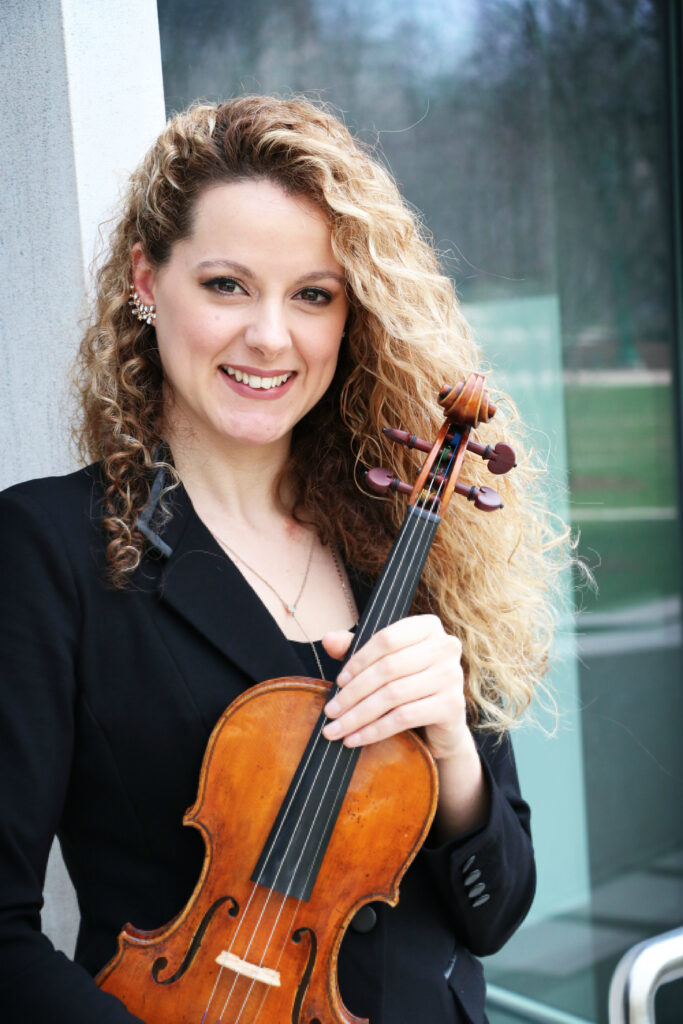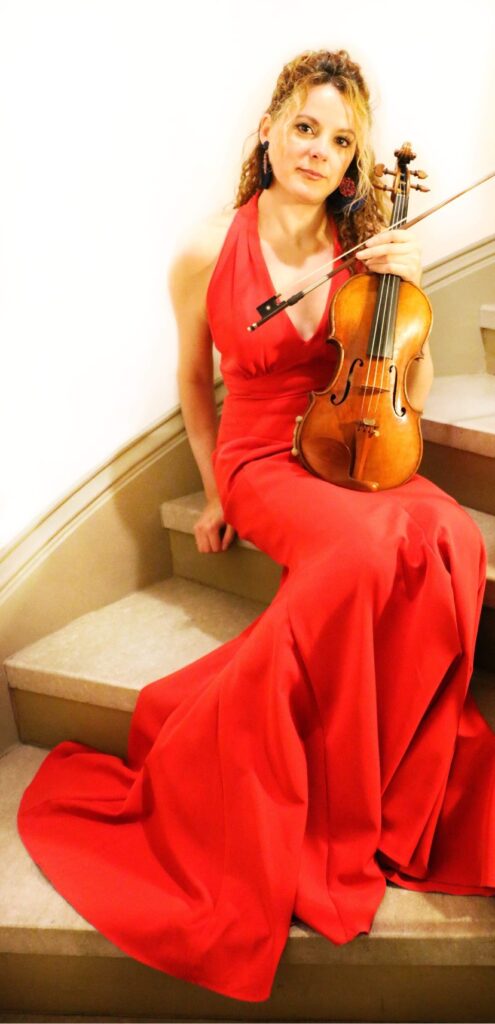For the past year, Patricia Quintero has been playing on opus 693, a violin patterned after the Leduc violin of Guarneri ‘del Gesú’. She was recommended to us by Sphinx, the Detroit-based organization dedicated to increasing diversity in the arts.
(Interview by Brendan Taaffe, business manager)
I’d love to hear more about the community outreach that you’re doing.
Well, I used to do a lot of that. Remember I told you I worked at the Houston Symphony. With everything going on with the pandemic, they had to let me go. I’m one of those musicians having a really, really hard time. I am teaching a lot and am doing a lot of virtual programs with Sphinx. After that happened with the Houston Symphony, it has been busy for me. We had to do a completely virtual program with Sphinx. I play as concertmaster with the Sphinx Virtuosi, and before the pandemic we would do big tours—Carnegie Hall and Boston and the New World Center in Miami. So before I used to have a balance between teaching and playing, but there is no performing now.
You’re teaching on Zoom?
I have some students that are online. I’m also doing some in person teaching, but with masks and all the precautions.
I’m curious about online teaching. Have you needed to change the way you teach?
Yes, online is very hard to make the student understand and feel technical things with the instrument. In person, you can touch their shoulder or the elbow but online it’s really, really hard. We have to have a lot of patience. I have right now a girl that has started violin from scratch online. It was super challenging to make her understand technical things. She’s doing great, but I wish we would be in person. It’s very hard to teach an instrument online.
Are there any advantages?
Well, here in Houston the advantage is that you don’t have to drive (laughs) because the traffic is crazy. Other than that, I prefer the in person teaching. It’s good that we have the technology to keep doing lessons in the pandemic, but I don’t think there’s any advantage.
You grew up in Cuba?
Yes, I was born in Cuba and lived there for 24 years. I had finished all of my studies at university and started my career, and then I got an invitation from the University of Southern Mississippi to do a Master’s there with a full scholarship and I couldn’t refuse. That’s how I came to the States. After Mississippi, I finished my Master’s degree, I got into Indiana University. I did a diploma in Solo Performance at the Jacobs School of Music with professor Mauricio Fuks. After that, I got really excited with a string quartet and did a fellowship there. We did really well in the time we were together and got into Curtis. But right before going to Curtis, I got the job here at Houston Symphony, so I decided to come here and start settling down.
I’m curious about the differences between learning music in Cuba and learning music in the States. What have you noticed?
It’s super different. First of all, Cuba for a long time was really close to the Soviet Union, so we had a lot of Russian professors and a lot of Cubans went to Moscow and studied in the conservatory there. So the approach is very Russian. It is very different from here. When I was close to eight years old, I took exams to get into the conservatory. As a kid, we have to go to two schools: the normal school, and when we finish that, we go to the music school. All the instrument players have to study piano as well in Cuba. It’s a lot as a kid. You have the responsibility to maintain your normal school and then music school on top of that, with violin, piano, solfege, music history, all of that.
I’m grateful for that way of learning. Because you are taking lessons at the music school every day, you go faster than here and than most places, because you have a violin lesson every day with your teacher.
Now that you’re here, are you teaching the way you were taught, as a Soviet-trained Cuban? Or have you had to change the way you teach because expectations are different?
Of course, I have to adjust. For example, you know how in the Suzuki method you put tapes on the fingerboard? We didn’t have that in Cuba. Everything was memorizing the placement of the finger and training your ear. Being here I have to adjust to that, because I didn’t learn that way. I see the advantage of the finger tapes here, because the kid is just having one lesson a week and of course they will forget. Of course, I mix in a little of my background and the way I learn, and I also adapt to the way we teach here.
The other thing I observed when I was in Cuba is that the status of a musician in society is really different. It’s a government salaried job on par with an engineer or anybody. Whereas here in the U.S., I’ve been a freelance musician for years and I do not feel on par with a software engineer.
I’m the only musician in my family. My mother is a pharmacist. As a musician in Cuba, I had more income than my mom, but here it is just the opposite. If my mom were here as a pharmacist, she could have a really decent life. Here, I’m the one who struggles. As a freelancer, it’s very tough.
Are there advantages to being here as a musician?
Of course. When I was in Cuba, I felt like I had done everything that I could there. I played with fantastic, wonderful Cuban musicians there, but I found that it was time to set new goals. The opportunity in Mississippi was something I couldn’t refuse. Also, learning a new language. When I got here, I didn’t speak a word of English.
Not a word?
Not a word. Let me be honest. I wanted to go swimming back to Cuba. The culture shock was big, and not being able to understand anything was hard. But it was another challenge I had to face.
I’m so sorry to hear you lost the job with the Houston Symphony. What now? What are you hoping to do in the coming year?
I just want this to be over once we get the vaccine, and to be able to play and go on stage. I really miss that. I was supposed to go on tour this year with the Sphinx Virtuosi, and I really miss that. We are like a family, and I missed the opportunity to see everybody. I just look forward to playing again. I love teaching, but I love the balance between teaching and playing.
How are you able to keep up your motivation to practice without any performing opportunities?
It’s hard. But thanks to Sphinx, I have some opportunities to play online. That gives me something to look forward to and practice on. That has been a blessing. I have a lot of respect for teachers now, because teaching is exhausting. When I finish a day of teaching and come home, I’m very tired.
So you’re keeping busy.
Well, when the pandemic happened, I was like, “I don’t have a job. How am I going to pay my rent?” The symphony was my full-time job, so I lost everything—my insurance, my benefits. Of course, I went on unemployment for a while, but then I had to knock every door. I talked to everybody knew to find students. I’m busy with students now. That’s how I’m bouncing back.



